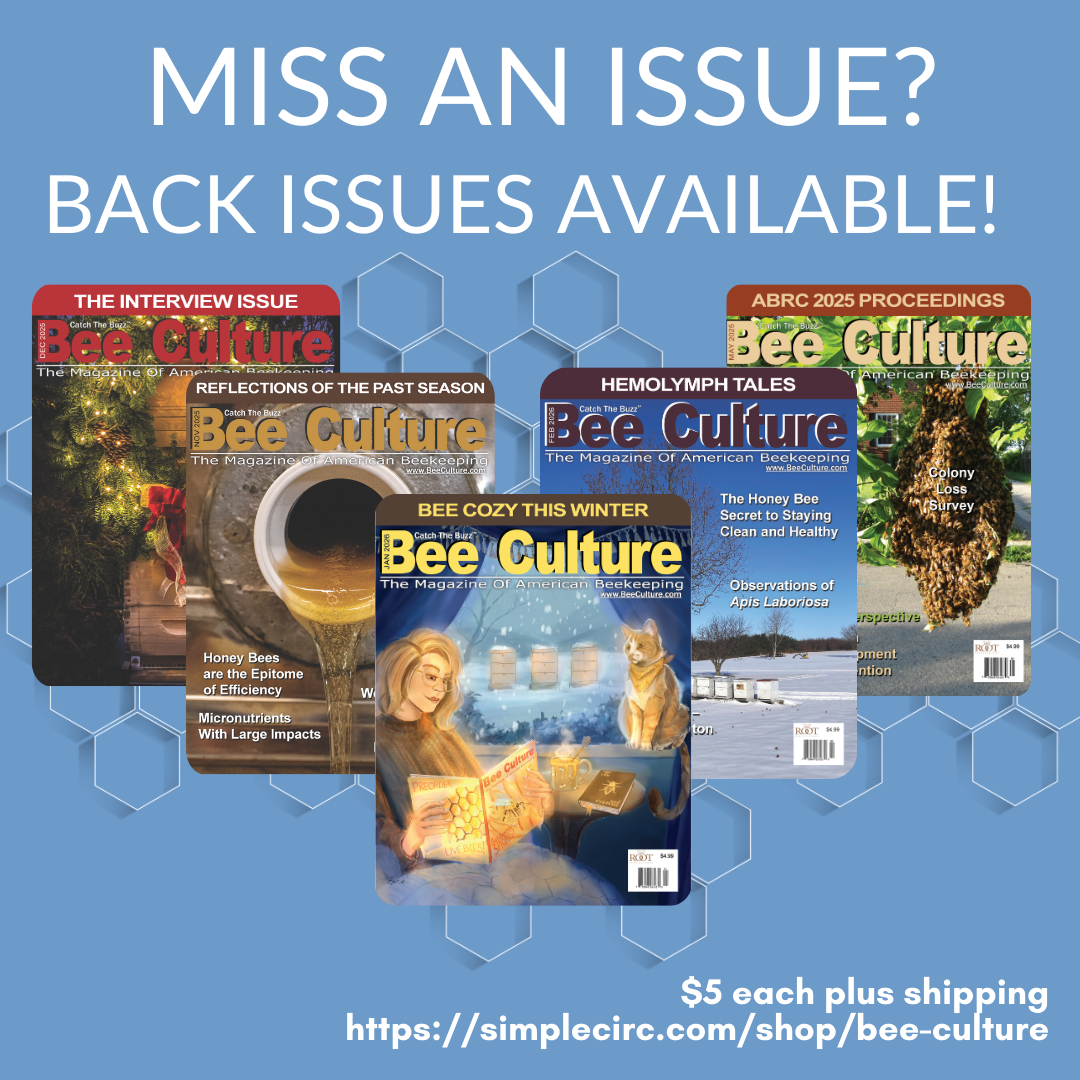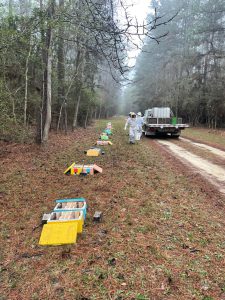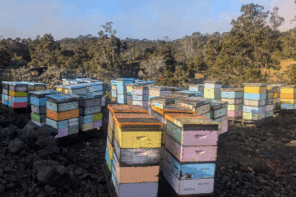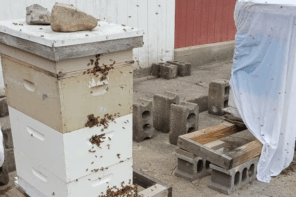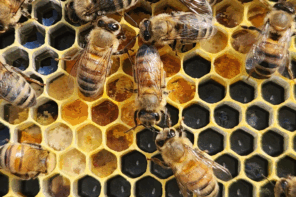An Interview with Dan Whitney
Becky Masterman & Bridget Mendel
Our favorite beekeepers are bee habitat obsessed, like Dan Whitney, owner of Whitney Lone Star Queen Company and Dan’s Honey Company. Dan’s operations are based in Jasper, Texas and Ottertail, Minnesota. Along with his beekeeping business, he has worked hard to advocate for bees and beekeepers. He served as president of the Minnesota Honey Producers Association for over six years with his term ending in 2019 and is currently on their board of directors. In these roles, he has worked closely with legislative efforts and state policy development. We are grateful that Dan agreed to be interviewed and excited to share part of his bee story with you.
Q: Tell us about your beekeeping business. How did it start, and what does it look like now?
A: I got into bees as a high school summer job. I worked for Jack and Russel Hoffman, around ‘88, ‘89. I grew up on a small farm, so I worked for farmers, and for beekeepers when they were busy.
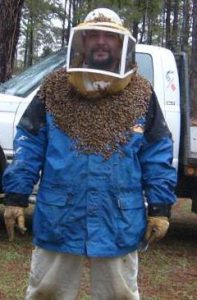
Dan Whitney, owner of Whitney Lone Star Queen Co. and Dan’s Honey Co. wearing a unique beard of bees. Photo provided by Dan Whitney.
Through them, I heard about Bob Walkin; he was a commercial beekeeper looking to retire. He had a thousand colonies and wanted to sell to a younger person. I was 21 when I started working for Bob. After one year, we went 50/50 on expenses. That was 1994 when I started keeping bees commercially.
Beekeeping is an apprenticeship. I got all my knowledge from a number of older beekeepers who have passed on now. You learn a lot from those old beekeepers…scientists have a lot of information, but when you run thousands of colonies, you have to find out what’s practical. So scientists can learn a lot from us, too.
Now I run about 2000 colonies for honey production. I would not want to run many more than that. If you run too many hives, you’re just managing people, not bees.
I consider myself a honey producer, but I also produce queens. We raise about 25,000 queen cells and produce 4000 mated queens. I love producing queens, and I wish I could only do that, but it doesn’t pencil out. In the future, maybe queens will be worth more, and I can focus less on honey production. But then again, how do you do that? The bees are gonna produce honey, and there’s the labor to process that honey.
We also sell about 1500 nucs each year. And typically, we send a load of bees to California, and a load to Texas. Then, we split those, and start the year over. Everyone winds up in Texas to get split, receive new queen cells, build up, then they come back to Minnesota.
Q: Are there any tasks that you find yourself doing as a beekeeper businessman that might surprise readers?
A: We wear a lot of hats as beekeepers. I also have a farm, and I plant a lot of flowers. It costs a lot for those seeds, but I enjoy it. We love wildlife, and we hunt. We’re right on the edge of Northern Minnesota.
There’s also a lot of work to do with visas for my employees. I have three great workers from Honduras. Two of them are brothers, the other is their cousin. I’ve known their family for decades. These guys have been with me for about six years, and now we are pretty close to getting their green cards. Then they can travel back and forth more easily. Through the H2A program, they stay for about 10 months at a time. That’s tough, that’s a long stretch of time to be away from home. I couldn’t do it…it’s hard work. But with green cards, I could fly them up to Texas for a few weeks as needed, then they could go back home.
Q: Beekeepers are facing a lot of challenges, some of which we hear about often: lack of forage, pesticides, mites, etc. What keeps you up at night?
A: Mites that are resistant to Amitraz! Our mite counts in August this year were too high (I consider anything over one mite per 100 bees too high). When that happens, I always panic and think “This time it’s resistance to Amitraz.” It turned out fine; we got the mites under control now, but resistance would be a game changer for commercial beekeepers.
There’s nothing else out there where you can keep your mite counts low enough to avoid PMS etc. We need better products. We need a better quick-hitter. There’s too much focus on not killing any bees. If you aren’t killing a few bees, you probably aren’t killing the mites. The tradeoff for a healthy hive is worth it. It’s like chemotherapy. We need something practical to use that works in our industry.
The other thing I worried about is Tropilaelaps…if that mite gets to us, that would be a mega-game changer. Commercial beekeepers would have to increase their employees just to manage that new mite.
Q: Are you worried about climate change? If so, how do you think it will affect beekeepers ? If not, why not?
A: I’m not worried about climate change. I think it’s real, but I can’t control it. The earth is always going through changes. My job is to deal with it. Last year at this time we had a foot of snow. This year is warm. The weather has been so unpredictable in the last 20 years. The one predictable thing is unpredictability.
As a beekeeper, you just have to adapt. It’s hard to change, but the beekeepers who are still in the business are savvy people who are willing to adapt. You can’t be a calendar beekeeper. You have to react to the particular year and stay on top of it.
Q: What is something you wish hobby beekeepers understood about commercial beekeepers?
A: We’re not the enemy. We do care about our bees. Beekeeping is animal husbandry. I’ve seen grown men cry when they lose a living thing. It’s your life, it’s your livelihood. I grew up on a farm where we brought animals in the house when there’s a blizzard. I wish hobbyists would care for their animals. Commercial beekeepers might replace their queens every year, but letting your hives die due to mites is crueler than replacing your queens every year.
We wish hobbyists would take better care of their hives, and keep their mites under control. It affects us all if they don’t keep their bees healthy through managing mites.
Q: If you weren’t a beekeeper, what would you be doing?
A: I could see myself being a family practitioner. That’s interesting to me. I like small towns, so I would still be living in a small town. I would never want to live on the coast, or in a big city.
Acknowledgement
The authors would like to thank Dr. Marla Spivak for helpful edits and suggestions.
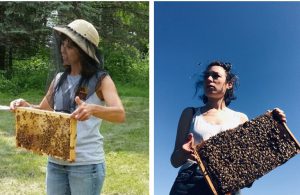 Authors
Authors
Becky Masterman led the UMN Bee Squad from 2013-2019 and currently alternates between acting as an advisor and worker bee for the program. Bridget Mendel joined the Bee Squad in 2013 and has led the program since 2020. Photos of Becky (left) and Bridget (right) looking for their respective hives.




